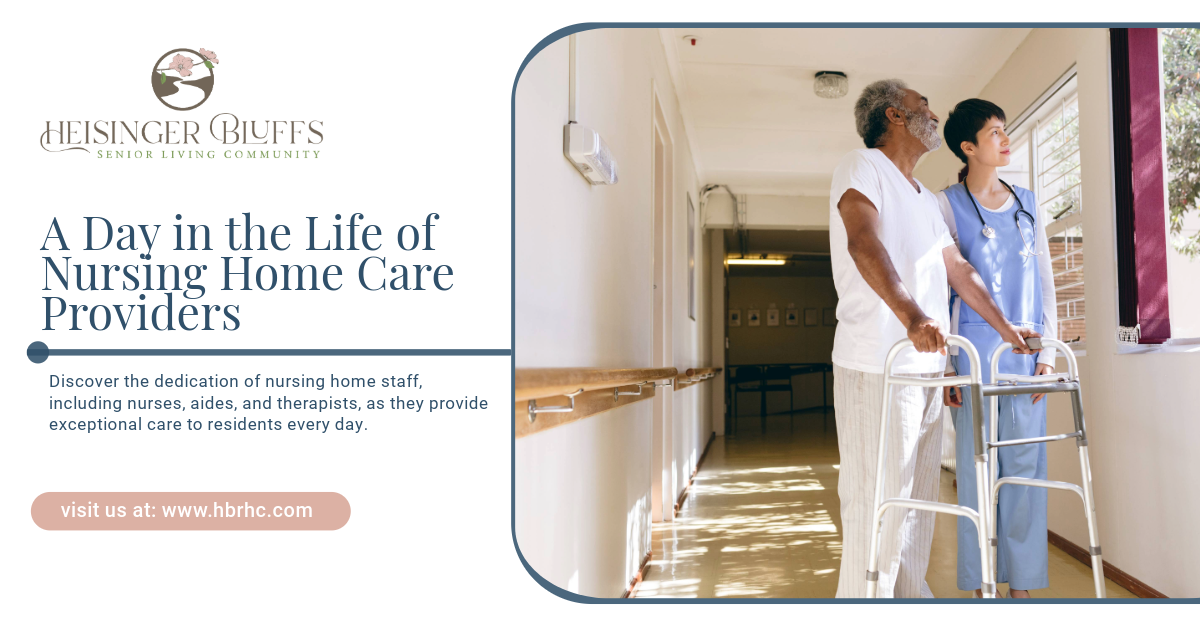A Day in the Life of Nursing Home Care Providers

Spotlight on Nursing Home Staff: A Day in the Life of Care Providers
Behind the serene environment of nursing homes lies the tireless dedication of the care providers—nurses, aides, and therapists. These professionals play an essential role in ensuring residents receive compassionate care, medical attention, and emotional support. This blog delves into their day-to-day responsibilities, showcasing their commitment to the well-being of senior residents.
Morning Routines: Setting the Tone for the Day
The day for care providers often starts before dawn, ensuring everything is in place to meet residents' needs.
1. Nurses: The First Point of Contact
Nurses begin by reviewing medical records, checking vital signs, and administering morning medications. They are the primary coordinators of residents' health plans, ensuring everyone receives tailored care.
2. Aides: Offering a Helping Hand
Certified nursing assistants (CNAs) assist residents with activities of daily living (ADLs), such as dressing, bathing, and grooming. Their empathetic support helps residents feel dignified and comfortable.
3. Therapists: Designing Individualized Plans
Physical, occupational, and speech therapists start planning sessions early, focusing on therapies that promote mobility, independence, and communication.
Midday Hustle: A Team Effort
Afternoons are often the busiest time in nursing homes. Staff must balance medical care, personal assistance, and group activities.
1. Administering Care
Nurses perform wound care, monitor ongoing treatments, and provide health updates to families.
Aides ensure that residents enjoy nutritious meals tailored to dietary restrictions while assisting those who need help eating.
2. Engaging Residents
Activities directors collaborate with therapists to provide enrichment programs. From group exercises to cognitive games, these activities promote physical and mental health while fostering social interaction.
3. Emergency Preparedness
Nursing staff are trained to handle emergencies, such as falls or sudden health complications. Quick decision-making and teamwork are vital during these critical moments.
Evening Calm: Wrapping Up the Day
As the sun sets, care providers shift their focus to ensuring residents are comfortable and safe for the night.
1. Evening Medications and Monitoring
Nurses conduct a second round of medication administration and document any changes in residents' health. They also address concerns raised during family visits.
2. Evening Care Routines
Aides assist residents in changing into sleepwear, maintaining hygiene, and preparing for bed. Their patient and gentle approach helps residents wind down.
3. Therapy and Rehabilitation
Therapists wrap up the day with light evening exercises or one-on-one counseling sessions, if needed.
Going the Extra Mile: Emotional and Social Support
Care providers are not just medical professionals; they are companions, confidants, and advocates. Their ability to build trust and emotional connections profoundly impacts residents' well-being.
- Nurses: Act as liaisons between residents, families, and medical teams.
- Aides: Bring warmth and humor into residents' lives, brightening their days.
- Therapists: Encourage residents to achieve their personal goals, celebrating every milestone.
Challenges and Rewards
1. Challenges Faced by Staff
- Emotional exhaustion from witnessing health declines or loss.
- Balancing individual care with the demands of multiple residents.
2. Rewards of the Role
- Building lasting relationships with residents and their families.
- Knowing they make a difference in residents' quality of life.
Why Nursing Home Staff Are Unsung Heroes
Nursing home staff dedicate themselves to improving the lives of seniors. Their roles require compassion, resilience, and adaptability. From managing complex medical cases to simply offering a listening ear, they embody the essence of care.
Final Thoughts
The exceptional staff at Heisinger Bluffs are dedicated to providing compassionate care, ensuring every resident feels valued, respected, and supported. If you're looking for a senior living community where care providers go above and beyond, schedule a visit today to experience the difference for yourself.
Frequently Asked Questions
What qualifications do nursing home staff need?
Nurses require an RN or LPN certification, while aides typically need a CNA license. Therapists must hold relevant degrees and state licenses.
How do staff handle emergencies?
Staff undergo extensive training in emergency response, including CPR and first aid. They follow established protocols to ensure quick and effective action.
What is the staff-to-resident ratio in nursing homes?
Ratios vary depending on the facility's size and care level. On average, it is 1 staff member for every 5–10 residents during peak hours.











